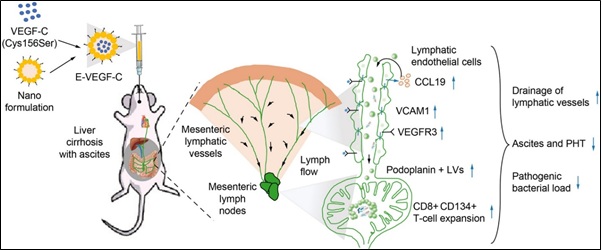Ministry of Science & Technology
A new approach to treatment of liver cirrhosis
प्रविष्टि तिथि:
01 AUG 2025 3:25PM by PIB Delhi
A team of Indian scientists may have found a way to improve the drainage capacity of lymphatic vessels in the liver and intestine that fails in case of cirrhosis, by using nanocarriers filled with a powerful protein called VEGF-C.
Chronic liver disease can progress from mild disease to fibrosis to cirrhosis. Patients with advanced cirrhosis often develop decompensation with complications like fluid accumulation in the abdomen (ascites).
Cirrhosis is accompanied by distortion of both blood and lymphatic vessels in the liver and intestine. The lymphatic vessels run parallel to the blood vessels, draining extravasated interstitial fluid, proteins, and immune cells and transporting them back into the venous blood. Intestinal mesenteric lymphatic vessels (mLVs) are increased in cirrhosis but remain dilated and dysfunctional.
Due to increased liver congestion and pressure of the portal vascular system, the production of abdominal lymph increases by 30-fold in cirrhosis. An increased lymph formation along with reduced lymph flow and drainage capacity of the existing mLVs, leads to development of abdominal fluid accumulation in patients with advanced cirrhosis. Till date, there are no effective treatments for patients with decompensated cirrhosis.
Vascular endothelial growth factor-C (VEGF-C) is a key pro-lymphangiogenic factor that activates lymphangiogenesis or new lymphatic vessel growth. It does this through binding to a cell membrane tyrosine kinase receptor, vascular endothelial growth factor receptor-3 (VEGFR-3) the activation of which is essential for the growth and development of new lymphatic vessels.
Recombinant VEGF-C has earlier been proved to be effective in stimulating the growth of new lymphatic vessels, improving lymphatic drainage and immune responses.

Fig: This illustration highlights that vascular endothelial growth factor-C (VEGF-C) is a key pro-lymphangiogenic factor, offering improved mesenteric lymphatic drainage & gut immune response, making them promising candidates for the treatment of cirrhosis.
A team of scientists from Institute of Liver and Biliary Sciences (ILBS) New Delhi, and National Institute of Pharmaceutical Education and Research (NIPER) Guwahati, ventured to probe the therapeutic efficacy of VEGF-C in ameliorating gut lymphatic dysfunction and improving lymph drainage. They studied if VEGF-C could help reduce ascites and attenuate inflammation in end-stage liver cirrhosis.
Owing to the hydrophilicity, short half-life, and systemic side effects of VEGF-C, Dr Subham Banerjee’s team from NIPER Guwahati first focused on the development of VEGF-C encapsulated reverse micelle-based nanocarriers which specifically binds to VEGFR-3 homodimers.
Next, the ILBS team led by Dr Savneet Kaur, tested the developed VEGF-C nanocarriers extensively in animal models of advanced cirrhosis and portal hypertension. The developed molecule was delivered via oral route to ensure its gut lymphatic vessel uptake in the animal models. The team showed that VEGF-C nanocarriers significantly increased mesenteric lymph drainage, that reduced ascites. Importantly, the treatment also led to an attenuation of the portal pressures, improved cytotoxic T-cell immunity in mesenteric lymph nodes, and reduced local and systemic bacterial load.
This research, funded by the Nano Mission of the Department of Science and Technology (DST) and published in the Journal, JHEP Reports is the first one to highlight that therapeutic lymphangiogenesis with VEGF-C is a promising treatment for reconstructing the fragmented lymphatic network and restoring lymphatic function and drainage in advanced cirrhosis.
Translating VEGF-C nanocarrier systems or agents that target the VEGFC-VEGFR3 signaling axis into preclinical studies in large animals followed by safety, dose and efficacy studies in initial phase human trials in patients with decompensated cirrhosis, could help develop an alternative treatment for the disease.
***
NKR/PSM
(रिलीज़ आईडी: 2151269)
आगंतुक पटल : 1500